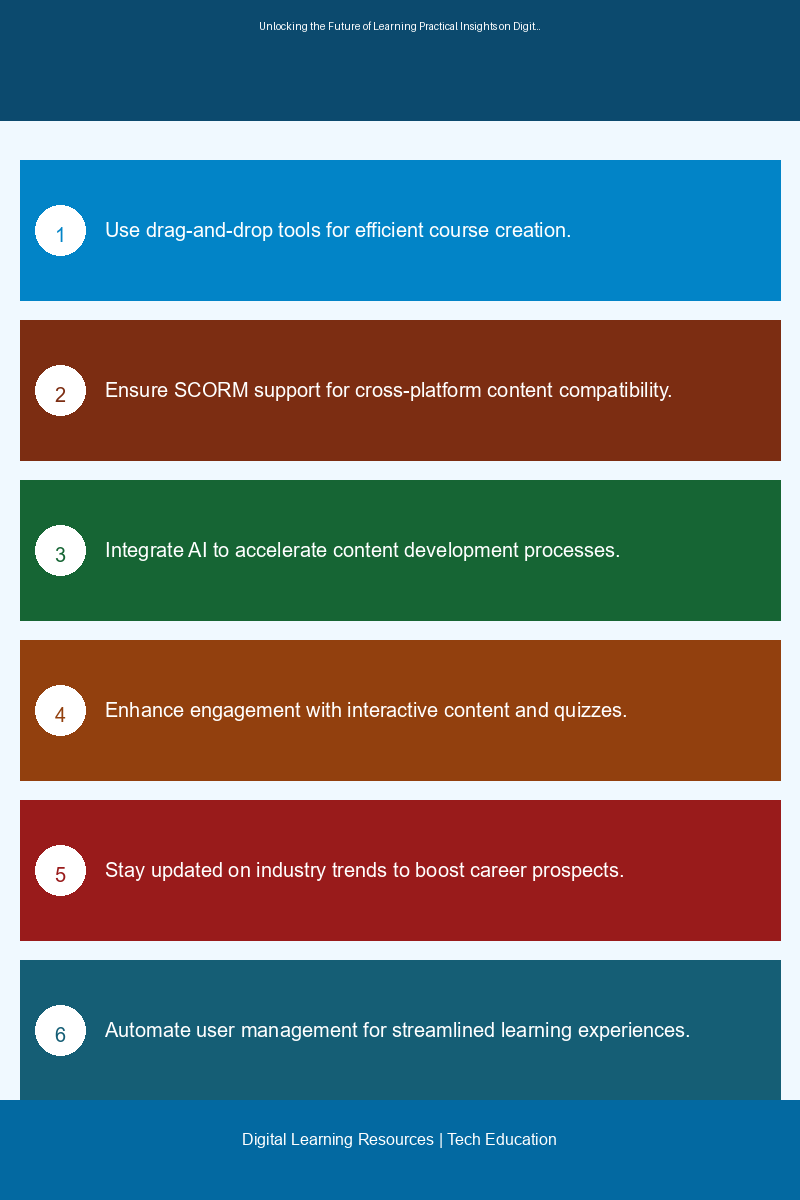In a world where technology is evolving at lightning speed, the demand for accessible, engaging, and effective learning solutions is more critical than ever. Whether you’re a developer, IT professional, or tech learner, understanding the latest tools and methodologies for course creation and certification can significantly enhance your career opportunities and skill sets. In this post, we’ll explore the technical concepts, practical applications, and future trends shaping the landscape of digital education.
Key Takeaways
- Utilize drag-and-drop interfaces and automation for efficient course creation.
- Leverage SCORM support to ensure content compatibility across various platforms.
- Incorporate AI-assisted content creation to speed up development processes.
- Enhance learning experiences with interactive content and quizzes.
- Stay ahead of industry trends to better position yourself in the workforce.
Technical Background and Context
As the eLearning landscape evolves, several technical concepts and methods have emerged as essential components for creating effective digital products. Here’s a closer look at some of the most impactful features:
- Drag-and-Drop Interface: Many modern Learning Management Systems (LMS) offer intuitive drag-and-drop interfaces for course creation, allowing users to build and launch courses without needing extensive IT or instructional design expertise.
- Automation and User Roles Management: Automation features streamline course management, while user roles help in assigning appropriate access levels, making it easier to manage large groups.
- SCORM Support: SCORM (Sharable Content Object Reference Model) ensures that your learning content is compatible with various LMS platforms, enhancing the reach and usability of your courses.
- AI-Assisted Content Creation: The use of artificial intelligence in content development allows for rapid course creation, reducing the time it takes to bring your courses to market.
- Interactive Content Transformation: Tools like Coassemble can convert existing documents into engaging, interactive learning experiences without requiring learners to log in, enhancing accessibility and ease of use.
Practical Applications and Use Cases
Understanding the technical aspects of course creation is one thing; knowing how to apply them effectively is another. Here are some practical applications:
📚 Recommended Digital Learning Resources
Take your skills to the next level with these curated digital products:
AI Enhanced Resume Builder
AI Resume Builder Flask App – Complete Source Code + PDF Tutorial + HTML | Digital Download for Designers
AWS Solutions Architect Associate SAA-C03 Complete Study Guide & Practice Exam Bundle
AWS Solutions Architect Associate SAA-C03 Complete Study Guide & Practice Exam Bundle
📊 Key Learning Points Infographic

Visual summary of key concepts and actionable insights
Learn AWS: Your First Cloud Application
Learn AWS: Your First Cloud Application
Comprehensive SAT Prep: 470+ Vocabulary Words
Comprehensive SAT Prep: 470+ Vocabulary Words
JavaScript for Web Development eBook | Learn to Build Interactive Websites
JavaScript for Web Development eBook | Learn to Build Interactive Websites
- Small Business Training: With user-friendly LMS solutions like TalentLMS, small business owners can create and manage training programs for their teams without needing a dedicated IT department.
- Soft Skills Development: Ready-made soft skills courses available through platforms like TalentLibrary can be integrated into existing training modules, allowing for a well-rounded educational experience.
- Dynamic Quizzes and Knowledge Checks: Incorporate quizzes into your training modules to reinforce learning and measure comprehension, which can be invaluable when preparing participants for certification exams.
Learning Path Recommendations
For tech professionals looking to enhance their skill sets, the following learning paths are recommended:
- Course Creation Mastery: Learn how to use drag-and-drop course builders, integrate SCORM, and implement automation features to create effective training programs.
- Soft Skills Certification: Pursue certifications that focus on soft skills development, which are increasingly valued in today’s tech-driven job market.
- Interactive Learning Techniques: Explore methods for transforming static content into interactive learning experiences, utilizing tools like Coassemble and TalentLMS.
Industry Impact and Career Implications
The rise of user-friendly LMS platforms and the growing demand for engaging training formats are reshaping the landscape of professional development. As small businesses increasingly recognize the need for effective training solutions, knowing how to navigate these systems can set you apart in the job market. Additionally, as companies pivot towards interactive training, professionals skilled in creating engaging content will be highly sought after.
Implementation Tips and Best Practices
To maximize the effectiveness of your course creation efforts, consider the following tips:
- Start Simple: Begin with a clear outline of your course content before diving into the technical aspects. This will help you organize your thoughts and ensure that your course flows logically.
- Utilize Templates: Many LMS platforms offer templates that can save you time and provide a structured approach to course design.
- Incorporate Feedback: Gather feedback from learners after course completion to identify areas for improvement and make necessary adjustments.
- Stay Updated: Continuously educate yourself on industry trends and new technologies to keep your skills sharp and relevant.
Future Trends and Skill Requirements
As technology continues to drive change in education, several trends are emerging that will shape the future of digital learning:
- Emphasis on Mobile Learning: With an increasing number of learners accessing content via mobile devices, optimizing your courses for mobile use is essential.
- Microlearning: Short, focused learning modules are gaining popularity as they cater to busy professionals who prefer bite-sized content they can consume quickly.
- Enhanced Personalization: The future will likely see more personalized learning experiences, utilizing data analytics to tailor content to individual learner needs.
Conclusion with Actionable Next Steps
As you navigate the world of digital course creation and certification, remember that the right tools and methodologies can significantly enhance your learning and teaching experiences. Start by exploring user-friendly LMS platforms like TalentLMS and Coassemble, and consider developing your soft skills through available courses. Stay informed about industry trends and continue building your technical skills to remain competitive in the tech landscape.
Take the first step today by signing up for a free LMS trial, engaging with interactive courses, or participating in webinars focused on course creation techniques. The future of learning is here—make sure you’re equipped to thrive in it!
Disclaimer: The information in this article has been gathered from various reputed sources in the public domain. While we strive for accuracy, readers are advised to verify information independently and consult with professionals for specific technical implementations.
Ready to advance your tech career? Explore our digital learning resources including programming guides, certification prep materials, and productivity tools designed by industry experts.



